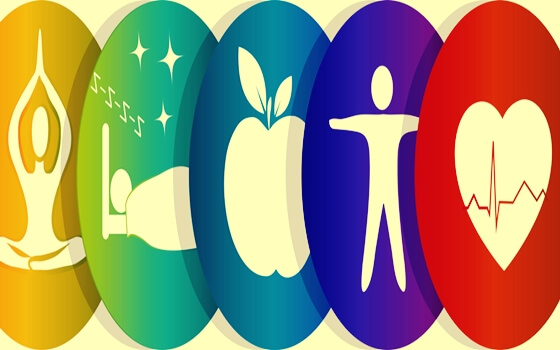Discover Wellness: Integral Health and Body-Mind Balance


Written and verified by the psychologist Valeria Sabater
Wellness is an interesting concept of well-being. The purpose of Wellness is to improve your quality of life, prevent physical or mental illness by caring for, attending to, and boosting several aspects. These include your nutrition, body, emotions, relationships, and environment, among others. It’s a concept of comprehensive health that is on the rise and worth knowing about.
It’s likely that you’ve seen a Wellness center in your town, where they offer a spa, gym, and sophisticated relaxation spaces. There’s also no doubt that many hotel franchises use this term for financial purposes and to widen their clientele. However, and this is worth stating, at times the essential purpose that this approach was conceived for is left behind. Even more so since it was founded over 50 years ago.
This is not a new idea in the least. This integral approach to well-being originated a few years after the end of the Second World War. The social and economic model improved little by little, and with it, other types of needs gained footing. These include personal growth, freedom, and the opportunity to choose, to develop ourselves psychically and emotionally.
It was a fascinating and decisive moment. In that instant, psychology became aware that its scientific model needed to open up to other possibilities. Thus, many professionals decided, for example, to stop focusing on the treatment of mental illnesses in exchange for providing people with mechanisms, resources, and strategies to learn to be happy. It focused on making people invest in their well-being, in their own self-realization.
The pioneer and creator of the Wellness movement was Halbert L. Dun, a doctor and biostatist. Throughout the 1950’s Dun acquired greater popularity due to his conferences and his books. His message was clear and very inspiring. “People need to live in a world that is more aware, taking advantage of their potential to the fullest.”

The 7 keys to understanding Wellness
We have mentioned how hotel franchises or health centers offer weekend experiences associated with Wellness. These centers sometimes show us a mistaken idea of what this movement was originally seeking. Wellness isn’t something one should try out during a getaway or during vacations. It is a lifestyle which you should integrate into your everyday life.
Thus, it’s to be expected that more and more therapists are acquiring training in this strategy which seeks to optimize potential. It’s worth noting that it’s not an easy task. It’s an extremely active process which requires willpower, perseverance, full awareness, and decision-making.
If many of us go to the doctor every time something feels off, have an ache, or get sick, what Wellness intends is to prevent the emergence of certain diseases and disorders. It does so by reminding you, for example, the importance of eating correctly, doing sports, or taking care of one’s emotional world.

We’re therefore facing a new concept of “mind-body” well-being which teaches the individual to create healthier and happier living conditions. Thus, the individual will be capable of reaching their maximum potential and acquiring a stronger health.
Let’s look at the dimensions which comprise Wellness.
1. Physical well-being
How would you define physical well-being? The first thing that comes to mind is without a doubt “the absence of disease.” However, for Wellness, one must go beyond this. Because being healthy is not simply limited to being free of any type of ailment, it’s about “feeling good”.
- For example, think about people who suffer from arthritis, arthrosis, or lupus. As we know, these are chronic illnesses. Thus, what Wellness would seek in these cases is to improve their quality of life as much as possible.
- In order to invest in their physical well-being on a daily basis, one must leave aside unhealthy habits such as tobacco, get medical checkups, and reduce their stress. As well as knowing which diet is best suited for each individual and discovering what type of physical exercise would be most beneficial for them.
2. Emotional well-being
In this case, a Wellness-trained therapist will give you the appropriate strategies and techniques to recognize your own emotions. He will help you manage them and, thus, invest much more and better in your own well-being.
3. Intellectual well-being
The ability to open one’s mind to new ideas, concepts, perspectives. and experiences is the key to self-realization and happiness. Staying active, curious, and, above all, receptive to everything that surrounds you is a fantastic way to improve your quality of life.

4. Social well-being
Now, let’s ask you a question. Do the people in your social circle truly provide you with what you need? At times, you become so accustomed to certain social dynamics that you cease to notice how it affects you. You don’t realize the stress they produce and the unhappiness this impact accumulates.
Being aware of this and becoming selective when choosing who you wish to keep by your side is another essential, defining mechanism of Wellness.
5. Environmental well-being
This aspect is not as well-known. At the very least, it is oftentimes overlooked. Environmental well-being refers to your ability to recognize your own responsibility in the balance of nature. It’s not about limiting yourself to avoiding scenarios of pollution or living in the middle of the wilderness instead of in a city.
We’re talking about environmental awareness. The idea is that small everyday gestures carried out by each one of us lead to real results.
Wellness also teaches us the importance of always choosing food which has been organically grown, how to make your home and city more sustainable, how to take care of the planet, how to recycle, how to reduce the impact of plastics, etc.
6. Occupational well-being
Are you happy with and at your job? Are you satisfied with the activity that occupies a greater part of your day? Your work responsibilities mark a large part of your life and time, you know this. In fact, that’s where your sources of stress and anxiety are most concentrated. Thus, it’s vital that you reflect upon this aspect.
Wellness also seeks to improve this area. It wants you to delve into your skills, vital objectives, and desires in order to create an authentic harmony between your personal and work-related spheres.
7. Spiritual well-being
Spiritual development within this approach is also an important step. It derives from the need to develop that inner peace where your life is in line with your values. You must always have a vital purpose which impulses you to get up every day, to gather strength, hope, and optimism.

To conclude, we are without a doubt referring to a set of practices which integrate a very concrete type of philosophy. The same one that the very Halbert L. Dun conceived in his time and which emphasizes one’s personal responsibility above all else. We are a whole, made up of emotions, a mind, a body, our relationships, and the environment we inhabit. These aspects all make up a single unit which every science should start to conceive in a broader and more inclusive manner. Science… and also ourselves.
Therefore, let’s invest time and willpower into taking care of ourselves a little better. Take care of all of these areas that we sometimes neglect or overlook, without even realizing it…
This text is provided for informational purposes only and does not replace consultation with a professional. If in doubt, consult your specialist.








